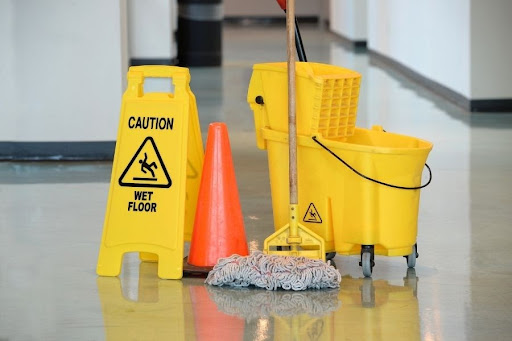
How To Win your Slip and Fall Workers Comp Claim
Let’s say you work in a factory or warehouse setting. You’re taking inventory when you slip, landing hard on your back. Turns out someone spilled a jug of liquid and you didn’t see it. You’re hurt but your pride is really what’s injured. So, you get up, have a laugh or two with your co-workers, go home, and a few days later, you wake up with horrible back pain.
After a visit to the doctor, you’re diagnosed with a sprained pelvis. The treatment? Bedrest for three weeks. Can you collect workers’ compensation for medical expenses and lost wages from a slip and fall? Absolutely. Under Ohio’s Workers Compensation laws, workers do not need to prove fault to bring a claim.
However, the best chance of having your claim approved depends on you following the workers’ compensation claim process.
Step 1: Report the injury to your employer
An injured employee is required to provide written notice in a timely manner. While some injuries may require immediate treatment at an emergency room, others may require a doctor’s visit for diagnosis. Regardless of how insignificant the injury may seem, report it to your employer right away.
Step 2: Contact a workers comp lawyer
Workers compensation laws are complex and updates are frequent, you are probably qualified for more benefits than you think. Filing incorrectly or incompletely can result in claim denial and/or abbreviated benefits. Benefits may include; injury compensation, medical benefit, death benefit, loss of use benefit, temporary disability, permanent partial disability, change of condition, vocational rehabilitation, and multiple injury compensation.
Step 3: Fill out the necessary paperwork
In Ohio, the majority of workers’ comp matters involve the BWC (Bureau of Workers Compensation), while some large employers are granted the privilege of administering and paying claims on their own (self-insured employers). Regardless, your claim is filed in the same way.
Your claim can be filed on your own, by your employer, by your treating physician, your managed care organization, or by your authorized representative (e.g., workers comp attorney or union representative).
The party who files the claim completes a First Report of Injury (FROI) on the BWC website or completes and mails a paper copy to any BWC service office.
Step 4: The insurer approves or denies the claim
If your claim is approved:
The insurer will inform your employer and you with payment details. You and your workers’ compensation lawyer may:
- Accept the insurance company’s payment offer, which might cover the costs of medical bills, medicine, disability payments, and a portion of lost wages
- Negotiate for a lump-sum settlement or larger structured settlement
If your claim is denied:
- Request a reconsideration from the insurance carrier
- You or your lawyer can file a formal appeal through the state workers’ comp board.
Step 5: Return to work
Once you can return to work, you must provide written notice to both your employer and the insurance company. Depending on the severity of your injury, the insurance company may have to pay permanent disability benefits.
Many employers choose to implement a formal return to work program, to help employees return to work as quickly as possible. These programs may offer modified duties or teaching alternate skills if they’re unable to resume their regular responsibilities.
Don’t Handle This Alone.
The simplest way to maximize your claim is to hire an experienced workers’ comp attorney.
Although these tips are the best ways to maximize your workers’ compensation claim, with over 40 years of experience, workers’ comp lawyer Thomas Marchese has other skills and proven litigation tactics to further maximize what you may be entitled to.
If you’ve been injured on the job, call me today. We’ll get started on your case so you can focus on healing.




